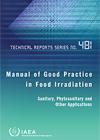The number of people facing food insecurity has more than doubled since 2020. The State of Food Security and Nutrition in the World (SOFI) report unveiled that in 2022, between 691 and 783 million people across the globe experienced hunger. Global food security faces mounting pressures due to the escalating demands on natural resources and risks associated to climate change, both of which threaten the overall sustainability of food systems at large.
Atoms4Food is an initiative to help countries boost food security and to tackle growing hunger. The initiative seeks to provide countries with ground-breaking solutions tailored to their specific needs and circumstances by harnessing the advantages of nuclear techniques along with other advanced technologies to enhance agricultural and livestock productivity, natural resources management, reduce food losses, ensure food safety, improve nutrition and adapt to the challenges of climate change.





